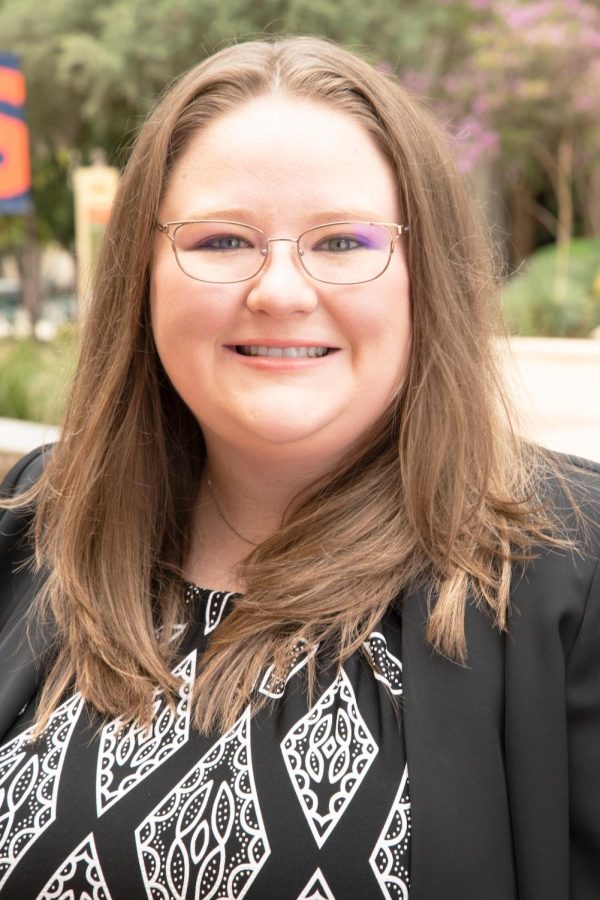University College launches healthcare management degree this spring
Dr. Rebecca Schroeder (pictured above) explained that the degree launch was a combination of student demand and job market analysis.
February 14, 2023
UTSA is offering a multidisciplinary studies degree program in healthcare management for the first time this semester. The new B.S. degree program offered by the University College incorporates three areas of focus — healthcare administration, public policy and data analysis and community health.
Pearson defines healthcare management as a field that “encompasses the efforts involved in planning, directing, and coordinating nonclinical activities within healthcare systems, organizations, and networks.” Consistent with this definition, the university’s official website states the new program aims to “create a comprehensive experience, leaving students primed to successfully transition into a leadership role in the public or private sector that serve the healthcare industry.”
The projected job outlook for medical and health services managers from 2021-2031, as reported by the U.S. Bureau of Labor Statistics, is 28% as compared to the average growth rate of five percent for all occupations.
Dr. Rebecca Schroeder, assistant dean of curriculum and programs at the University College, explained that the new program was created due to a combination of job market research and student demand.
“Within HCaP, students had really been showing interest in healthcare management type program[s],” Schroeder said.
“Whenever we are researching different areas that we may want to [use] to create a niche area, we always are looking for [the top job markets] that are expanding right now,” Schroder added. “And we look and see [if we have something that] our students could capitalize on to propel them in that arena.”
Dr. Rhonda BeLue, associate dean for community engagement and partnerships at the College for Health, Community and Policy (HCaP), explained that the multidisciplinary studies degree in healthcare management is just a stepping stone for a full bachelor’s degree in the discipline. If approved, a bachelor’s degree in healthcare management would help prepare students for graduate-level degrees in the field. BeLue hopes the separate bachelor’s degree — a collaboration between HCaP and the Alvarez College of Business — will be approved by 2024.
“So the ultimate goal was really to have a bachelor’s [degree in healthcare management] and just along the road [as] kind of a placeholder is the [multidisciplinary studies degree],” BeLue said.
Furthermore, the fate of the multidisciplinary studies degree in healthcare management when its corresponding independent bachelor’s degree is offered is still being discussed.
In the meantime, the new degree in healthcare management joins the list of six other focused programs under the multidisciplinary degree program that offer enrolled students the opportunity to earn a Bachelor of Science degree. Similarly, four Bachelor of Arts-focused programs are also offered by the University College. Students who enroll in these programs, or what Schroder describes as “niche areas,” need to follow a “prescribed list of courses.”
The University College also offers customizable B.A. options under the multidisciplinary studies degree program. This option allows students to be more flexible and choose three focus areas from the existing majors or minor degrees and available certificate options at UTSA.
“That way, they can create something that was truly modeled around what they [want] their marketable skills to look like whenever they [graduate from] UTSA,” Schroeder said.
While the healthcare management degree falls under one of the focused programs, Schroder explained that students still have some room to customize.
The admission process for the multidisciplinary studies degree program does not differ from that of other degrees at UTSA; however, students admitted into the program have to take an introductory class as part of the degree plan.
“[The course] allows us to have that one-on-one time with the students and make sure that they are customizing things in a way that will benefit them in the long run because whenever you are talking about students, specifically [from underrepresented populations] like [in an] HSI, you want to make sure that they have clear guided pathways,” Schroeder said. “So we did not want them to just get in there, get into the degree program [and] be kind of floundering. So, that’s our one-on-one time with them.”
Regarding the above-mentioned focused multidisciplinary studies degree programs like the B.S. in healthcare management, collaborations between the concerned colleges are important. The University College serves as a bridge in formulating plans for these degree programs.
“We identify something or even sometimes, colleges have come to us and said, ‘Hey, we are kind of interested in this. What would you think?’ Because it would need to be a collaboration among a bunch of different colleges,” Schroder said. “So, that’s really where [the University College comes in] … we are able to then coordinate with the different colleges [and] start those discussions and create something that is multidisciplinary and allows us to really capture what we are wanting to focus on but not within the constraints of just one college.”
“We have a lot of students that are interested in jobs in healthcare [and] other than being [a] physician or a clinical provider … healthcare management is a great career,” BeLue said. “It is a necessary career, and it is a growing field … it is a nice opportunity for those that are interested in … the intersection of management and health but do not necessarily want to be a clinical provider.”
More information about admission to the healthcare management multidisciplinary studies program can be found at https://future.utsa.edu/programs/undergraduate/healthcare-management/ while information about the multidisciplinary studies program, including focused programs offered, can be found at https://www.utsa.edu/uc/mdst/.







